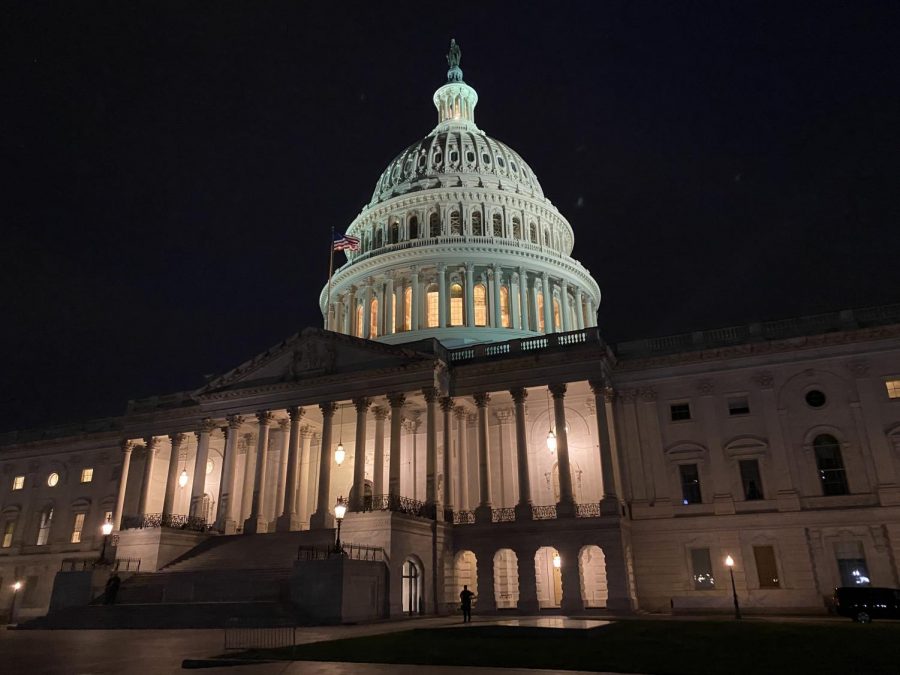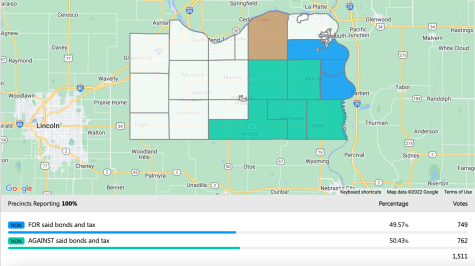The Next Month in the United States Congress
The United States Capitol Building where Congress will be deliberating on several important issues.
Murray, NEB- In the last few months, students have probably heard about the debt ceiling or government shutdown. They’ve heard about the spending bills in Congress and inflation, but they most likely haven’t heard an explanation of what these complex financial decisions mean for them. There’s a lot happening in the United States Congress and there are numerous deadlines coming up. Let’s break it down.
The Debt Ceiling
The debt ceiling is a number set by Congress by legislation. This number is the maximum amount of debt the United States federal government is allowed to take on.
The national debt of the United States is around $29 trillion dollars. That may seem like a lot of money we owe but there’s more to it. The national debt is in reality different from the personal debt you take on with a credit card or loan. The federal government is not borrowing this cash from a bank, because they are not a consumer of dollars but rather the producer of dollars. They produce the currency needed to run a functioning economy and government in the United States. The real restriction on what they produce is inflation. When too much cash is in the system, the value of the dollar could decrease or things could become more expensive. Luckily, according to the Federal Reserve, the federal government’s issuance of currency to cover spending is not the culprit of the 6 percent inflation we are seeing in the country.
As to the debt ceiling, Congress sets an artificial number on how much debt they allow the federal government to create. It’s been evident for a while now that we will hit that ceiling. Congress extended the ceiling earlier this year till Dec. 3. The Department of the Treasury now estimates we can avoid the debt ceiling until Dece. 15. Congress needs to raise the ceiling or the United States will default. Default means that the country will stop producing dollars and be unable to continue operations.
For Americans that almost certainly means stock market collapse, high unemployment, the end of social security benefits and other aid, and a larger scale economic depression. This is something we all want to avoid but party politics may keep getting in the way.
Government Shutdown
Congress has another responsibility on Dec. 3 as well. That is to allocate money for the operation of the government for the next year. This is basically assigning the dollars we produce to certains areas for a certain amount of time. Without allocation of this money, the federal government is not allowed to operate as normal and must “shutdown.”
This does not mean that the military will stop defending us or that the government ceases to exist. What it does mean is closures at the Post Office, stopping of social security benefits, and layoffs for government employees. Another situation that we don’t want on our hands.
Biden’s Spending Bills
At the same time, President Biden and Congressional Democrats don’t have much time left to work on implementing the policies they promised to the American people. With elections coming in 2022, they only have till the end of the year to get something done. Half of the plan is actually done. As Biden signed the Bipartisan Infrastructure Bill into law, this bill provides $550 billion in new spending. Programs include universal high speed internet, electric vehicle production, roads and bridges, public transportation, and schools. Nebraska has been allocated $3 billion of those funds for infrastructure projects in the state. This has been seen as a win for the President as Republicans and Democrats get behind a plan to improve the nation’s infrastructure.
The second half is the Build Back Better Bill. The President’s plan for social services and aid to the American people. This includes the continuance of monthly payments through the child tax credit, universal preschool, free school lunch, an expansion of Medicare, programs to fight climate change, and other programs. This bill total is expected to cost around $1.7 Trillion in new spending over the next 10 years. This bill has a much harder time becoming law however. Republicans have refused to back more social service spending and Democrats are fighting amongst themselves. Speaker of the House Nancy Pelosi has vowed the House will stay working as long as it takes, even over Thanksgiving, to get this passed. In the Senate, Majority Leader Chuck Schumer has set the goal post as Christmas to get it passed. The outcome of these crucial holiday votes will impact not only the politics of 2022, but the lives of millions of Americans.
Inflation
Inflation has become a problem in the country. Some attribute it to the government’s raising of debt or Biden’s spending bills. It’s highly debated what the source really is, but Americans are seeing that things cost more. Some economists have attributed the 6 percent inflation to the economy sorting itself out after the COVID-19 pandemic. Others associate it to Wall Street financial games and corporations trying to increase their wealth. Whatever the cause of higher gas prices and expensive food is, the Biden Administration continues to say that inflation will come under control soon. They say the Federal Reserve and Treasury are actively working to bring numbers back to the accepted 2 percent level.
The bottom line is whether it be the debt ceiling or spending bills, there is a lot for Congress to do in the next month.

Jayden Speed is a junior this year at Conestoga High School. Jayden is the President of the Junior Class, a member of the National Honor Society, Mock...





